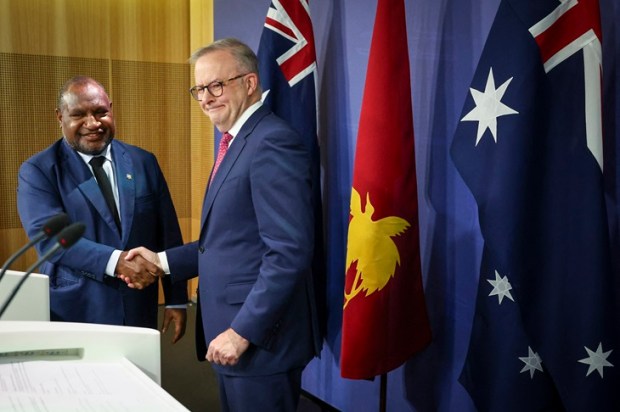Populism! It’s a word on everyone’s lips but is it an unspeakable political horror or our bright hope for the future? Well, the ‘progressive’, ‘liberal’ Left know what’s what and are ever ready to enlighten us, in their predictably hyperbolic and doctrinaire style, that populism is nothing but a ‘far-right’ festival of anti-immigrant hate, racial prejudice, and ‘transphobia’ mixed with economic nationalist naiveté, just one goose-step away from fully-fledged fascism.
There is an Emmanuel Goldstein vibe to this ‘analysis’ by the Left, whether the object of their daily Two Minutes Hate be Trump or Farage or any of the European ‘extremists’ who have the temerity to do well in democratic elections. In the standard leftist critique of populism, the charismatically appealing, blunt-talking, taboo-busting populist figureheads become reduced to cartoon figures of political villainy that all decent, virtuous people can unite against in righteous outrage.
Whereas ‘populism’ is used by the Left as mere pejorative shorthand for ‘bad’ (but popular) policies, a much calmer definition is that populism is the politics of ‘giving the people what they want’ i.e. democracy. What the populist movement actually represents is a democratically-supported challenge to a system of political decision-making by an elite of centrist politicians, global mega-corporates, officially-approved ‘experts’, narrative-compliant judges, government bureaucrats, and assorted technocrats which has become ever more insulated from the practical needs and political concerns of regular people.
Populism in its current form primarily sets itself against a suite of related issues such as, in rough order of priority:
- Excessive immigration (both legal and illegal) and the associated ethnic transformation (of the West) manifested in the secular religion of multiculturalism.
- The harms of economic and political globalism (to which tariffs and other trade protectionist measures are a necessary first response, with an important aim being the revitalisation of domestic manufacturing).
- All forms of damaging ‘Woke’ woo-woo such as the racialist DEI (Didn’t Earn It) nonentities wafted up effortlessly into positions of power and privilege on the thermals of white guilt.
- Unnecessary, costly, and counter-productive wars (and foreign aid).
- The lawlessness of ‘progressive’, Woke justice.
A core populist political priority is free speech, which is anathema to a Left which sees people who hold views contrary to the Left as not just having different opinions but ‘wrong’, ‘misinformed’ opinions that need to be ‘fact-checked’ or suppressed. Dare to suggest that ‘diversity’ is not all that it is cracked up to be is to invite social ridicule or worse. In the eyes of the self-defined anti-populist Good People, populists are Bad People – morally unworthy bigots fit only for belligerent abuse or exile from allowable public discourse and debate. When the ‘gentle black giant’ or winsome ‘teenager of colour’ who suffered some misfortune at the hands of a white law enforcement officer turns out to be a low-life thug with a drug habit and a rap sheet who was resisting arrest and threatening the police with murderous violence, it should be possible to say so, without facing charges of ‘racist’ or ‘white nationalist’ or that all-purpose Woke vilifier, ‘fascist’.
The centrist parties of the political establishment will, naturally, unite against populism, beholden as the Uniparty is to the Chambers of Commerce political brand which is all in for open borders and rotten free trade deals, and forever wars and endless debt and deficit, wrapped up in all sorts of Woke frills. Until very recently, the only political force consistently challenging such an ideological accord between the traditional parties has been the dissident, populist right whilst a populist left has been nowhere to be seen.
This is changing, however. In Germany, the Bündnis Sahra Wagenknecht (whose eponymous founder had led a left-wing populist split from the rigidly orthodox, and woefully Woke, Left Party – Die Linke) polled extremely well in three recent state elections (in the old East Germany), just failing to take office in coalition with the right populists of the AfD, signifying the highly plausible parliamentary demise of the CDU/SPD, centre-right/centre-left monopoly on German politics.
In the US, the International Brotherhood of Teamsters, the nation’s largest union (and the equivalent of our Transport Workers Union), which had endorsed and funded every Democrat presidential candidate since 1996, withheld any official endorsement of the Kamala Harris’ Democrats following internal Teamster polls which showed massive membership disillusion with that so-called ‘party of the working class’, polls which split roughly 60-33 per cent in favour of Trump over Harris.
Earlier, in a 121-year first, the union sent its president to speak at the Republican National Congress following an invitation from candidate Trump. The International Association of Fire Fighters also opted for official neutrality (i.e. de facto support for Trump). Trump is no anti-union ideologue, rather he is a constructive negotiator, which was part of his pre-politics success in the property and construction business. Prominent former Democrats, Robert F. Kennedy, Jr., and one-time Democrat presidential nominee candidate, Tulsi Gabbard, are now on board with Trump. Elon Musk, a once-solid Democrat is now sharing a stage, and his wealth, and a mooted administration post, with Trump.
The Republican party under Trump is now the party of the American working class (particularly its blue-collar workers) as the Democrats have defenestrated their once loyal class base in favour of the weird, the Woke and the welfare-dependent engaging with ever smaller political dragons such as ‘micro-aggressions’, ‘cultural appropriation’, ‘trigger warnings’, ‘safe spaces’, gendered bathrooms, and all the rest of it which nobody normal cares about. The things that matter to America’s increasingly populist working and middle classes are now completely foreign to the Democrats leaving a vacant political space for a Trumpian Republican party to dramatically reconfigure the party along class lines.
In Australia, there have been few confirmed sightings of populism (of right or left) at the party level. Dutton is no Trump and Australia’s major right-of-centre party does not look like becoming a party-political vehicle attractive to any insurgent dissident, populist Left as the Republicans have become under Trump. Australian populism, such as it is, remains the sole preserve of the political Right through Pauline Hanson’s One Nation, and, to some extent, Clive Palmer’s UAP. So, in Australia, populism remains just a political cuss word used by the Left of all shades, and by the centre-right, but, late to the party or not, its time will surely come even Down Under.
Populism – its weaknesses and potential
Populism, whether of left or right, or in tandem, will have a chequered learning curve. One of the main weaknesses of populism at this early stage of its development is an over-reliance on individual leaders such as Trump, Farage, Sahra Wagenknecht, and even Hanson and Palmer. The gravitational attraction of the Trump supernova to lesser celestial objects in the populist cosmos, for example, inhibits the growth of a stand-alone left-populist party that can provide an organisationally independent political home for populist-minded leftists who are not, and may never be, ready to make their peace with other, more conventional, aspects of the political Right.
Any right-populist and left-populist accord will contain tensions over such issues as, for example, the monarchy, abortion, voluntary euthanasia, global warming, industrial relations, etc. but these are not the central concerns of populist politics which remains motivated by a working-class-focused economic nationalism and immigration restriction, a nevertheless substantial area for political cooperation between populist right and left.
Underlying any potential populist coalition between Left and Right is the superglue of the resentment by the general population (or ‘deplorables’ and ‘garbage’ as some political buffoons see them) of being undemocratically ruled by identikit, centrist, ‘Fifty shades of Third Way’ politicians and their tame ‘experts’, a revolt which is both political and stylistic (refer Trump’s verbal circumlocution and politically incorrect fearlessness).
The populist-averse political commentariat may still be fascinated by the alleged ‘contest’ between the centrist dullards of right and left but regular people increasingly see the political blob as dullness personified (Kevin Dudd, anyone? Or Scomo, perhaps?), inimical to people’s practical needs and political concerns. Any charisma, dynamism, passion, inspiration, humour, memorable ‘bon-mots’ and genuine relatability belongs to the populists now. The dead weight of legacy voting habits (exacerbated by Australia’s compulsory preferential voting system – a rarity internationally) may mask the widespread political disillusion which underpins the populist mood below the equator but it does so with ever-diminishing effectiveness.
We are now in a political environment where both the political left and right, of an immigration –restrictionist, Woke-averse and working class economic revivalist hue, could march productively, and more or less amicably, together to the beat of a populist drum. Such a political grande marche could really rock the joint.

























